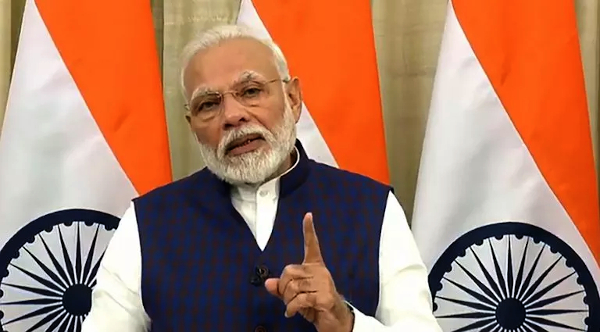New Delhi: India is at the forefront of vaccine development for Covid-19 with some of the vaccines in advanced stages, the Prime Minister said on Monday. Narendra Modi said also India was putting in place a well-established vaccine delivery system, through a digitised network along with the digital health ID, for the immunisation of citizens. The PM was addressing the Grand Challenges Annual Meeting 2020 through a video link which was attended by Microsoft founder Bill Gates, policymakers and scientific leaders. The meeting called for deepened scientific collaborations in solving global health problems, with an emphasis on Covid-19.
“Our population is four times that of the USA and many of our states are as populated as nations in Europe and Asia. But with a people-powered and people-driven approach, India has kept its Covid-19 death rate very low. Today we are seeing a decline in the number of cases per day and the growth rate of cases. India has one of the highest recovery rates of 88%. This happened because India was one of the first countries to adopt a flexible lockdown when total cases were just a few hundred, one of the first to deploy rapid antigen tests, one of the first to encourage usage of masks and work on effective contact tracing,” Modi said.
The PM said beyond Covid-19, India was now known for proven capacity to produce vaccines and medicines at low cost. “More than 60% vaccines of global immunisation are manufactured in India. We included indigenous rotavirus vaccine in Indradhanush immunisation programme. This is a successful example for a strong partnership for long-lasting results. The Gates Foundation has been part of these efforts,” Modi said.
The digital health ID that the PM was referring to was a project announced by Modi on August 15, under which every Indian would be given a unique ID that would work like his or her health account, and store that individual’s medical records. Speaking earlier in the day at the centenary convention of University of Mysore, the PM said the pace and ambit of reforms in various sectors for boosting growth had increased in the last six to seven months for helping crores of youths in the country and building a strong foundation for this decade.
He pointed out that there had been multiple reforms in sectors like agriculture, labour and industry in the last six years. He said the gross enrolment ratio of girls was more than boys at all levels of education now and that the enrolment of girls in IITs had reached 20% this year compared with 8% four years ago. “Even after so many years of independence, in 2014 there were only 16 IITs in the country. In the last six years, on average, a new IIT has been opened every year. As of 2014 there were only nine IIITs, 13 IIMs and seven AIIMSs in the country. Whereas in the subsequent five years, 16 IIITs, seven IIMs and eight AIIMSs were either established or in the process of being created,” the PM said.
“More autonomy is being given to such institutions as well so that they can take decisions according to their needs. The first IIM Act gave more rights to IIMs. The National Medical Commission has been created to bring more transparency in medical education. Two new laws are being enacted for reforms in Homeopathy and other Indian medical practices,” the PM said. Modi termed the new National Education Policy as multidimensional to make youth competitive through a flexible and adaptable education system. “Skilling, reskilling and up-skilling are the greatest need of the hour to ensure our youth are flexible and adoptable to the fast-changing nature of jobs,” he said.
Source: ET
You may also like
-
India Against Mpox
-
Combination of ‘Siddha’ Drugs Reduces Anemia in Adolescent Girls: Study
-
Suspected Mpox Case Under Investigation; Patient Put Under Isolation, No Cause for Alarm
-
Prime Minister Applauds India’s Best Ever Performance at the Paralympic Games
-
National Exit Test (NExT) for Ayush to be Effective from 2021-2022 Batch: Union Minister of Ayush Shri Prataprao Jadhav
